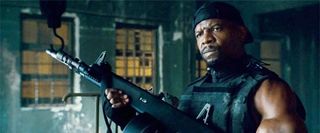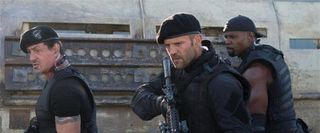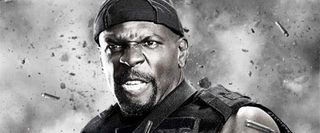The Expendables 2's Terry Crews Talks Bonding Through Pain And Stallone's Sense Of Humor

Sylvester Stallone isn’t really known for his comedy. While he does have a few funny movies on his resume (or at least movies that were supposed to be funny), he’s largely known for boxing, firing guns and killing Vietnamese. But if you ask Terry Crews, who has a solid comedic background of his own, about the humor of Stallone his answer may surprise you.
I recently had the pleasure of sitting down one-on-one with Crews, who reprises his role as Hale Caesar in The Expendables 2, to talk about the production of the new action film. Check out our conversation below in which we talk about the pressures of making a sequel, bonding through pain, and his bringing more to the character than muscles and guns.
This movie seems like it must be a total blast to make. Is being on the set of a movie like The Expendables 2 as fun as it looks?
It was a hard movie to shoot. A lot of people think, “Oh, they must have had a ball, hahaha,” hanging around, but there was an intense pressure because of the success of the first one. So the tone on the set was, “Let’s not mess it up.” [laughs] And because we have so many characters… I was actually at the grocery store and people were like, “Are you doing 2? Are you doing 2? Don’t mess up Hale Caesar! Hale Caesar has to come back!” And you start to realize what this means to a lot of people. It’s much bigger than you would even think because characters become iconic and so the pressure was, “Oh man, let’s give them more! Let’s find out what worked and blow that up and do it more.” And it was awesome, but it was kind of hard. We were away, we were in Europe, I was away from my family for months. And it was one of those things where we really just got tighter. Men bond through pain. Women bond through hanging out and all that; when guys are hurting together…”Ahh, my knee!” Then it’s like we’re brothers [laughs]. We’re like a band of brothers. And that’s what makes it special, man. We feel like we are a unique fraternity. I was driving up here in my car and seeing the Expendables 2 billboard and you go, “I will forever be a member of this clique.” You can’t kick me out!
You mention the pain: obviously there’s a lot of training and work involved in making movies like this. Were you walking away sore from days on set?
Yeah, yeah. In particular I remember there was one huge scene and we had it steadicam’d up – it was this huge long steadicam – and I had to pick up this guy and swing his head into a pole. And he’s a grown man! [laughs] I’m picking this dude up and my back was like, “Whoa.” Praying to god, because you never know. Weird things happen – you tweak a knee, you twist something… We did it about eight times and I was like, “Man, I don’t know if my back can handle another take.” But we got it! We finally got it. There were a lot of those moves where you jump from here to there and you wonder, “Uh oh. Hold on.” I remember my shoulder was really affecting me, and that’s when the tank hits the pizzeria with the rocket and I had to jump down. And you wonder if you’re going to tweak your arm…it’s so weird because in the adrenaline rush, that’s where the injuries happen. When you’re just going, going and then you’re like, “Uh oh. I think I hurt something.” [laughs] So there was a lot of that, man. When it was intense it was.

Was there any kind of sense of competition on set between the group?
CINEMABLEND NEWSLETTER
Your Daily Blend of Entertainment News
The competition was, first of all, you see Sly [Stallone] – he’s in his sixties and he’s doing this. You better not complain [laughs]. You know what’s I’m saying? I better not saying nothing! And then you see the other guys and you don’t want to be the weak link and the only way to not be the weak link is to try and be above. So that’s where things start going like this [motions with his hands leveling one over the other]. Because nobody wants to be that guy. Timidity has no place in an Expendables movie [laughs]. You have to enjoy your moment. Don’t just have your moment and then be like, “Okay, don’t bother me.” There’s no way. “Humble” has no place here. Enjoy the camera! Let it love you! Take your moment! And that’s what I learned watching them. When you watch Bruce [Willis] and Sly and Arnold [Schwarzenegger] they enjoy their moments in the camera. They don’t shy away. And that’s what people want! You want Hale Caesar? I’ll give you Hale Caesar! I’ll give you Hale Caesar concentrated! Drink it! And put it down your throat! [laughs] To the point where it’s like, “Damn…” So that every little moment…because you never know what’s going to end up on the floor, you never know how much of the movie you’re going to get. But you know that if you gave your all on every little second you’re not going to be left behind. It’s gonna be good.
To talk a bit about approaching the character, in the first movie we meet Hale Caesar and learn that he’s a fan of the big guns and the big explosions, but this one we kind of get to see more of who he is. He has that scene when the group is camped out and we see that he’s kind of a chef! As an actor is it helpful to have those little details to sink your teeth into?
It’s awesome because in the first one our whole persona was, “badass.” “We’re badass mercenaries, we’re doing this, we’re going to get them…” And this time when you see that rapport in the pizzeria, we’re talking about our least meal, the whole thing… people finally see us without our gear and they get to sit down with us and enjoy who we are as people. And they go, “I like you. I like you!” And it’s weird because Sly is a brilliant magician. A ride like this is a ride – it’s like an amusement park. It has to be funny and it has to be scary at the same time. It’s a weird dynamic so that you feel every emotion so that when it’s done. “Woo! I want to do that again!” It takes you all the way through. This is the movie Sly really wanted to make when he had the chance. Nothing was left behind, everybody gave 300%, and it was refreshing. So even the comedy was a lot funnier than the first one.

And you do a lot of comedy work in addition to the action stuff. Are you trying to kind of get a joke or two in there? Is there any kind of improv?
No, and let me tell you why: Sly is one of the funniest guys. He was writing jokes on set, “I want you to say this, I want you to say that.” That thing about the donut: “I like donuts, but I don’t eat ‘em.” [laughs] What?! [laughs] And that’s Sly! He’s been waiting to say lines like this for years and he has this comedian in him. And he’s willing to poke fun at himself, at the genre, at what this is. He’s so funny, man. He would have been the guy in Hot Shots making fun of himself, but he was a big gigantic star! And now it’s like he gets to do it and he writes all those little jokes in there. We really didn’t improv that much. He would just sit there with the script and he’d be like, “Terry, this is a good one, this is a good one.” Our thing was if we were comfortable with the delivery. Delivery, timing, make it happen, and we started culling organically. I think, literally, this is some of the more special parts of the movie, even more-so than the action.
Obviously Stallone is such an influence on set, so what was it like having him there but having Simon West as the director?
Sly was always, always, always involved. But this is the thing: the first one, Sly was not happy because he was fighting injury, he’s starring, he’s directing, he’s writing, he’s doing everything, and you could see the physical toll. The first movie was literally his Heart of Darkness. Really, the kind of thing that [Francis Ford] Coppola went through to make Apocalypse Now is what Sly went through. You could feel like he was gonna lose his mind. You wondered, “Is he going to be okay?” Here he was happy Sly. Simon took on all the heavy lifting of the big shots and how this is gonna work and all that, and he could just work on the characters. He had that script in front of him, “Okay look, I want you to this and this and this…” and he was excited, he was happy. It was a good place. It made for a better place for us too.

Eric Eisenberg is the Assistant Managing Editor at CinemaBlend. After graduating Boston University and earning a bachelor’s degree in journalism, he took a part-time job as a staff writer for CinemaBlend, and after six months was offered the opportunity to move to Los Angeles and take on a newly created West Coast Editor position. Over a decade later, he's continuing to advance his interests and expertise. In addition to conducting filmmaker interviews and contributing to the news and feature content of the site, Eric also oversees the Movie Reviews section, writes the the weekend box office report (published Sundays), and is the site's resident Stephen King expert. He has two King-related columns.
Most Popular




